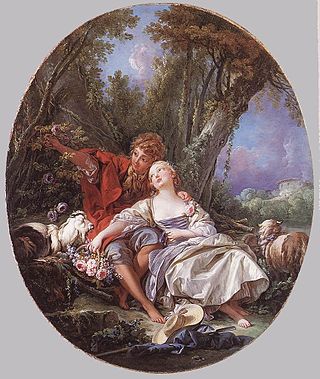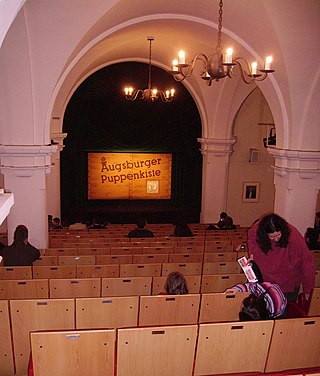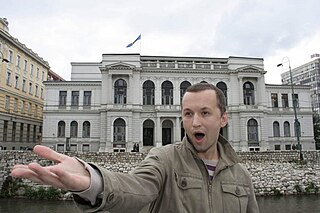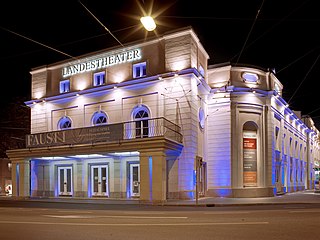
Puppetry is a form of theatre or performance that involves the manipulation of puppets – inanimate objects, often resembling some type of human or animal figure, that are animated or manipulated by a human called a puppeteer. Such a performance is also known as a puppet production. The script for a puppet production is called a puppet play. Puppeteers use movements from hands and arms to control devices such as rods or strings to move the body, head, limbs, and in some cases the mouth and eyes of the puppet. The puppeteer sometimes speaks in the voice of the character of the puppet, while at other times they perform to a recorded soundtrack.

A marionette is a puppet controlled from above using wires or strings depending on regional variations. A marionette's puppeteer is called a marionettist. Marionettes are operated with the puppeteer hidden or revealed to an audience by using a vertical or horizontal control bar in different forms of theatres or entertainment venues. They have also been used in films and on television. The attachment of the strings varies according to its character or purpose.

The Salzburg Festival is a prominent festival of music and drama established in 1920. It is held each summer, for five weeks starting in late July, in Salzburg, Austria, the birthplace of Wolfgang Amadeus Mozart. Mozart's operas are a focus of the festival; one highlight is the annual performance of Hofmannsthal's play Jedermann (Everyman).

Bastien und Bastienne, K. 50 is a one-act singspiel, a comic opera, by Wolfgang Amadeus Mozart.

The Augsburger Puppenkiste is a marionette theater in Augsburg, Germany.
Gretl Aicher was the Artistic Director of the Salzburg Marionette Theatre.

Count Franz Graf von Pocci was a significant official in the court of King Ludwig the First of Bavaria, best known as the founding director of the Munich Marionette Theatre where he was a shadow puppeteer and wrote countless puppet plays and children's stories.
Anton Aicher was the founding Artistic Director of the Salzburg Marionette Theatre. He founded the company in 1913 and was its leader until his death.

Peter Scriven MBE was an Australian puppeteer, writer and theatre producer, and the founding artistic director of the Marionette Theatre of Australia. Scriven played a huge role in establishing puppetry as a serious artform in Australia.

Karin Schäfer is a performance artist and the head of the Karin Schäfer Figuren Theater - Visual Theatre Productions company. After studying puppetry arts with Harry V. Tozer at Barcelona's Instituto del Teatro and working in Spain for several years, she returned to Austria in 1993.

A puppet is an object, often resembling a human, animal or mythical figure, that is animated or manipulated by a person called a puppeteer. Puppetry is an ancient form of theatre which dates back to the 5th century BC in Ancient Greece.

Jasmin Bašić is a Bosnian tenor and author.

The Haus für Mozart, or House for Mozart, is a 1,500-seat theatre of the Salzburg Festival in the city of that name in Austria. It was established in 1925 when horse stables were converted into a venue for the mystery plays that were a main facet of the five-year-old festival, becoming the festival's first dedicated performance space, its Festspielhaus. This name it retained through three rebuildings until, in 1960, the larger Neues Festspielhaus opened next door, whereupon it took the name Altes Festspielhaus, or Old Festival-House. But three seasons later, to end confusion in the minds of visitors unaware of the history, both theatres were renamed for their sizes, and the smaller was now the Kleines Festspielhaus. For forty-two seasons, through 2004, the nomenclature was settled. Then the theater was closed for its fourth gutting and reconstruction. It gained its current name upon reopening in 2006 as the festival's principal theatre for Mozart and Rossini operas as well as Baroque stageworks.

The Salzburg State Theatre is a theatre situated in Salzburg, Austria, a venue for opera, theatre, and dance, contemporary and older works, with resident companies of actors, singers and dancers. The theatre presents approximately 400 performances each season, from September to June. The main theatre building is located next to the Mirabell Gardens and seats an audience of 707. The staff consists of 340 people originating from 35 different countries.
The Lovelace Theatre was a puppet theater in Pittsburgh, Pennsylvania.
Hachioji Kuruma Ningyo is a Japanese puppet theater company that has been in the family of the founder of the kuruma ningyo style of puppetry since the 19th century. The company was named an Intangible Cultural Asset by the city of Tokyo and an Important Intangible Folk Cultural Property by the Japanese government. Since the mid 1990s, the company has been directed by Koryu Nishikawa V, who has brought the art form to international attention, touring mostly Europe and the Americas.

Circa Contemporary Circus is an Australian contemporary circus company. Based in Brisbane, Australia, Circa produces circus productions drawing on acrobatics, movement, dance, music and theatre that tour in Australia and internationally. The company was established in 1987 and was initially named Rock n' Roll Circus. It was an ensemble based contemporary circus company that focus on performing the voice of the people during a politically turbulent time in Queensland, Australia, during the Joh Bjelke-Petersen era before shifting to a director led company and was renamed 'Circa' in 2004 under the direction of Yaron Lifschitz.

Micheline Legendre was a Canadian puppeteer. She performed on television and on stage with her troupe, Les marionnettes de Montréal. Her oeuvre spanned 1,170 puppets created and more than 16,000 performances for 2.5 million audience members. Legendre was a violinist by training and her marionnette troupe played with the Montreal Symphony Orchestra and the New York Philharmonic, for Radio-Canada and the National Film Board of Canada, among others. She was also an art historian at the Université de Montréal.
Vera Schoenenberg is a German soprano in opera, operetta, Lied and oratorio, and a lecturer at the Mozarteum University Salzburg.
Jean-Paul Jeannotte was a Canadian operatic tenor, academic teacher, and opera administrator. He founded the Opéra de Montréal in 1979 and was its artistic director until 1989.














